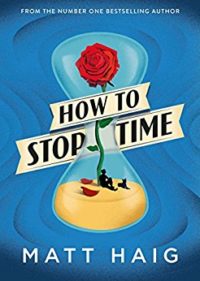A single sentence could render either of us insane
 How to Stop Time
How to Stop Time
by Matt Haig
I love Matt Haig’s Reasons to Stay Alive and his essays on mental health, plus he gives good Twitter, but I had put off reading his fiction. Why did I do that? Of course I was going to like it.
The narrator of How to Stop Time, Tom Hazard, was born in 16th century France. Now, in the 21st century, he’s working as a history teacher at a London comprehensive school. He’s not a time traveller, he has a medical condition that makes him age really really slowly. So slowly that he still looks to be in his 40s, not his 400s.
It’s science fiction that wears the science lightly but doesn’t avoid it. An explanation is given, and some details added, but the bulk of the story is about the emotional effect of the condition.
“Forever, Emily Dickinson said, is composed of nows. But how do you inhabit the now you are in? How do you stop the ghosts of all the other nows from getting in? How, in short, do you live?”
Hazard isn’t the only one. There is a secret society, run by a man called Hendrich, working to keep their existence hidden. Hendrich has his reasons, which are convincing, and his methods, which are less so. Hazard has been playing Hendrich’s game for more than a century but he’s starting to tire of it. For one thing, Hendrich has a strict no-falling-in-love rule and Hazard has just met the first woman to tempt him to break that rule in four centuries.
“There is a kind of stand-off. We both have more questions but we are carrying them in holsters waiting for the other one to fire away. A single sentence could render either of us insane.”
This is of course an excellent set-up to explore themes around age, death, the meaning of life and love, and what it means to be human. Hazard has spent a lot of time alone – both literally and in the middle of giant cities. He’s also tried doing a lot of different jobs and living in different countries. But he isn’t an empty cipher. He’s a real person in an unreal situation.
It’s also a basis from which to comment on the modern world from a historical perspective. Sometimes Haig does this subtly and sometimes less so. For instance, Hazard started life as a refugee – a Huguenot whose mother fled with him to England. When his condition first becomes apparent, his main fear is the local witchfinder. He understands persecution. But Hazard’s reflections on this are occasionally a little obvious, a little too like Haig himself editorialising.
“As far as I could see, this was a problem with living in the 21st century. Many of us have every material thing we need, so the job of marketing is now to tie the economy to our emotions, to make us feel like we need more by making us want things we never needed before. We are made to feel poor on thirty thousand pounds a year. To feel poorly travelled if we have been to only 10 other countries. To feel too old if we have a wrinkle. To feel ugly if we aren’t photoshopped and filtered. No-one I knew in the 1600s wanted to find their inner billionaire. They just wanted to live to see adolescence and avoid body lice.”
But aside from the themes and the central idea, this is above all a really enjoyable read. I was rooting for Hazard but also fascinated by the possibilities, good and bad, ahead of him.
Published June 2017 by Canongate.
Source: A free advance copy was supplied by the publisher via NetGalley.
My daughter has stolen my copy of this – I may not get to read it for some time! Nice review
How cheeky of your daughter! But I can see how this book could appeal to all ages. Hopefully your daughter’s a quick reader, so you can have your turn soon!